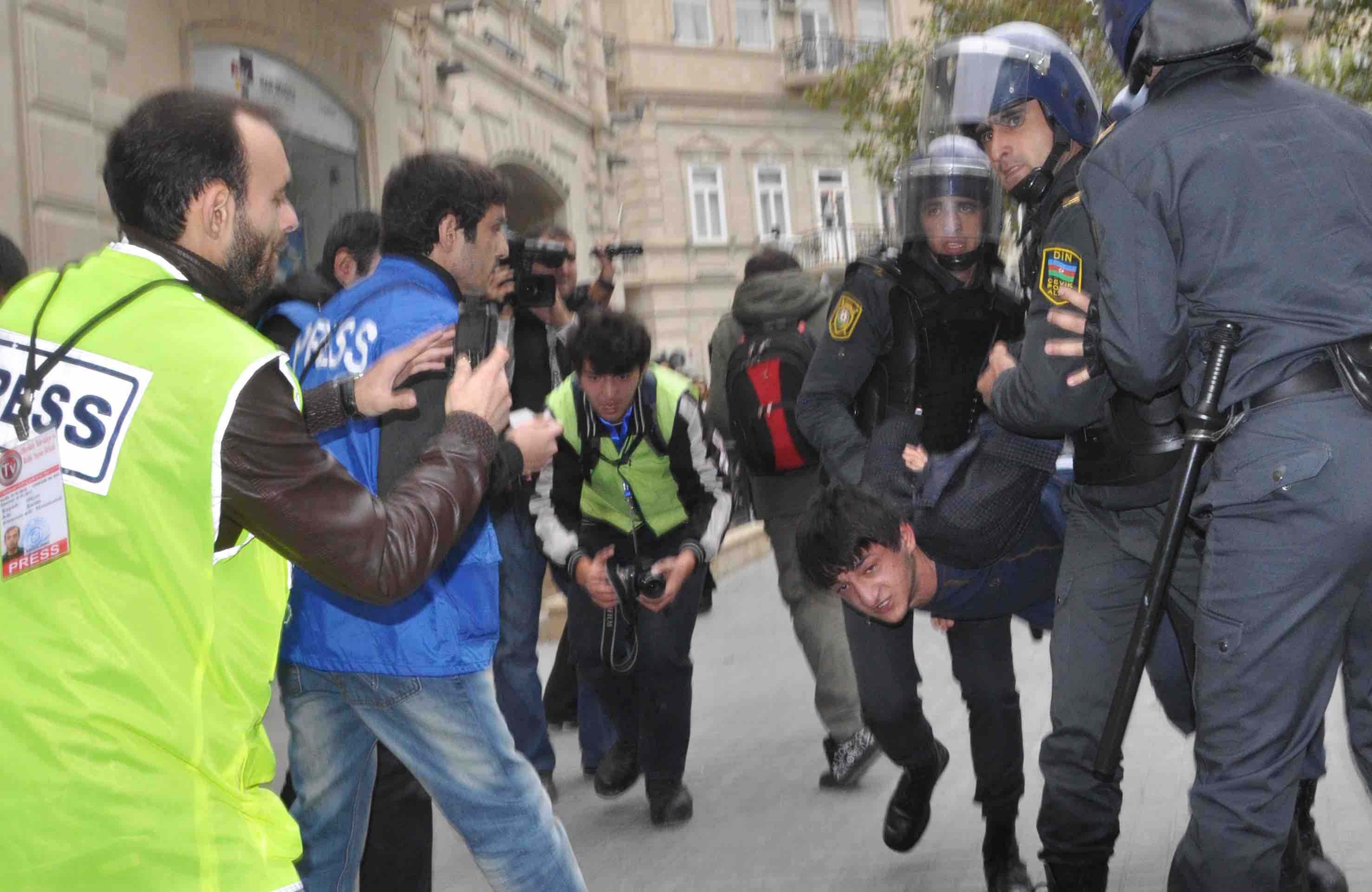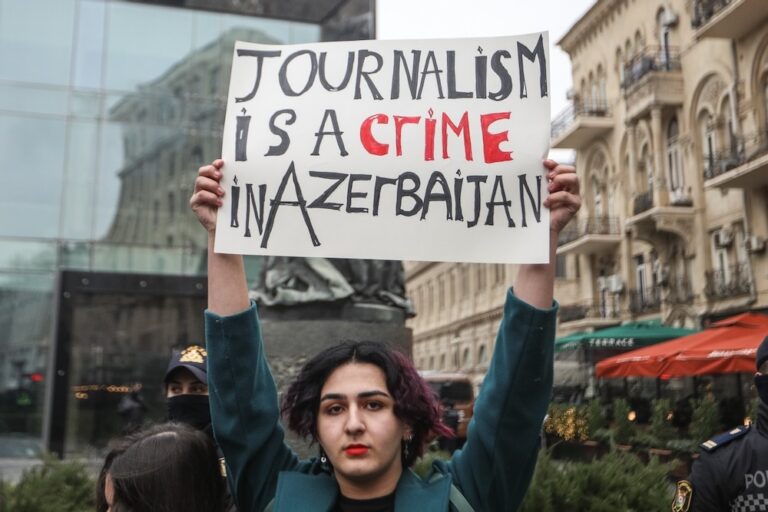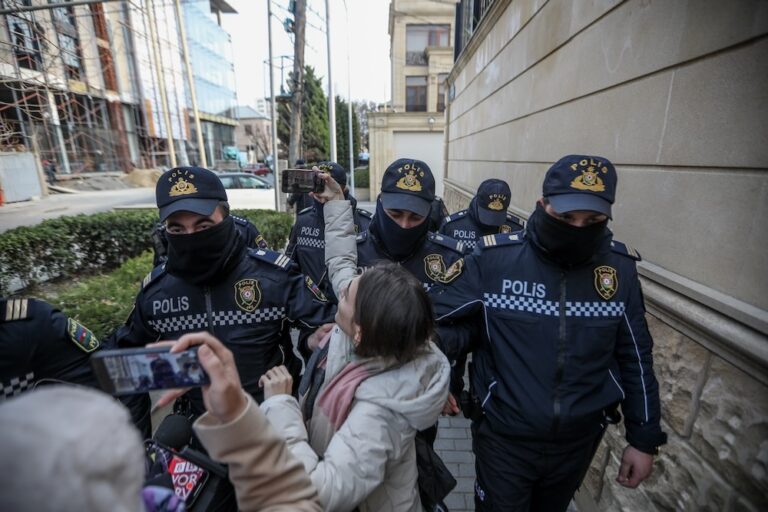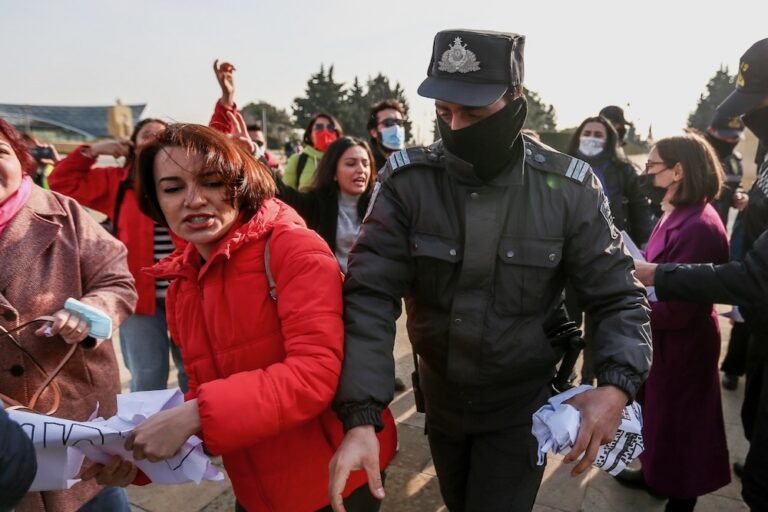Institute for Reporters' Freedom and Safety is in shock over the murder of longtime employee and board member, current Chairman Rasim Aliyev.
Institute for Reporters’ Freedom and Safety is in shock over the murder of our longtime employee and board member, current Chairman Rasim Aliyev. On August 8, 2015, unknown persons beat Aliyev to within inches of his life. He died several hours later in a hospital after doctors failed to provide necessary medical treatment.
We express our heartfelt condolences to Rasim Aliyev’s family members, friends, and colleagues, and declare that this murder is a constituent part of the Azerbaijan’s government policy of deliberately destroying the country’s civil society and voices of dissent. Azerbaijani physicians could have easily saved Aliyev’s life, but they refused to objectively diagnose him or place him under serious medical supervision in the intensive care unit.
Rasim Aliyev was born on August 16, 1984. On August 16, 2015, he would have turned 31. He was a graduate of the State Oil Academy. Rasim Aliyev resided with his elderly parents, but was engaged to be married and in the process of planning a wedding. He worked for IRFS since 2007. In addition to his parents and fiance, Rasim Aliyev is survived by one sister.
Aliyev’s death coincided with the one-year anniversary of the government’s closure of IRFS, including the human rights-focused online TV project “Obyektiv TV.” On August 8, 2014, Azerbaijan law enforcement confiscated all of IRFS’ equipment and documents, sealed the organization’s office shut, and sought to imprison IRFS founder and chairman Emin Huseynov. As one of IRFS’s most trusted and loyal colleagues, it was Rasim Aliyev, using his personal vehicle, who escorted Emin Huseynov out of the vicinity and to temporary safety while law enforcement raided IRFS’ office.
In October 2014, Rasim Aliyev was elected as IRFS’ chairman, to replace Huseynov. The protocol for this election was sent to Azerbaijan’s Ministry of Justice. Basically, Aliyev took it upon himself to lead IRFS through the organization’s most difficult time, when it was in effect paralyzed by never-before-seen levels of government pressure.
Rasim Aliyev’s murder took place amidst the backdrop of a crushing, unbearable human rights situation in Azerbaijan. Since mid-2014, the government has stopped the work of all independent non-governmental organizations, confiscated their property, and thrown countless human rights defenders who are critical of the government behind bars.
Over the last two years, journalists, human rights defenders, and other individuals critical of the Azerbaijan regime, including Anar Mammadli, Leyla Yunus, Rasul Jafarov, Intigam Aliyev, Seymur Hezi, Khadija Ismayilova, Ilgar Mammadov, Tofig Yagublu, Jadigar Sadigov, Hilal Mammadov, and Arif Yunus have been imprisoned on trumped up charges.
Leyla and Arif Yunus, and several other imprisoned Azerbaijani prisoners of conscience are at death’s door. Imprisoned on false charges and deprived of proper medical care, they are slowly dying in prison under circumstances much like those that killed Azerbaijani Talysh rights advocate and journalist Novruzali Mammadov. Furthermore, these individuals are being subjected to torture, and cruel, inhumane, and degrading treatment. Potentially deadly attacks have been organized in prison against Azerbaijani prisoners of conscience, including Ilgar Mammadov.
Although the Azerbaijan government is unable to throw into prison Azerbaijani dissidents who have asylum abroad, it imprisons their Azerbaijan-based relatives on false charges. A shining example of this is the recent imprisonment of relatives of journalists Emin Milli and Ganimat Zahidov. In further revenge, the government has barred opposition journalists, NGO workers, and their relatives from leaving the country. By holding the relatives and colleagues of foreign-based Azerbaijani dissidents hostage in Azerbaijan and threatening to murder them, the government attempts to stop these people from criticizing it. Azerbaijan-based relatives of the country’s exiled dissident are forced to renounce and publicly condemn their relatives.
Over the last three weeks, Rasim Aliyev received numerous threats via phone and the internet. Although he formally appealed to the police for protection, they rejected his request.
Rasim Aliyev’s case is not the first in which a journalist or human rights activist has been killed after a failed, premeditated attack, due to gross negligence of the law enforcement agencies and physicians. Through such incidents Azerbaijan’s authorities deliberately and openly show the public that a journalist who survives an assassination attempt will not be permitted to survive, but instead die slowly and painfully in a hospital.
On November 22, 2011, Rafig Tagi died in the same hospital where Rasim Aliyev died, after an attempt on his life. Alternative investigations conducted by journalists showed that although physicians could have saved Tagi, they instead created conditions for his death based on orders from higher up in the country’s government. Four years later, Rasim Aliyev has died under the same circumstances.
Over the last 10 years numerous journalists, including Elmar Huseynov, Rafig Tagi, Novruzali Mammadov, and Alim Kazimli, have been murdered, but not even one of these has been solved. On the contrary, Azerbaijani law enforcement impedes the objective investigation of these murders, preventing the murderers from being exposed and prosecuted.
Today Azerbaijan has become one big prison. While all dissidents may not actually be in prison, they live with the constant knowledge that at any moment they can be entrapped and jailed, or murdered.
All independent NGOs in Azerbaijan have basically been forced to cease their activities, the last few remaining opposition publications face closure, and journalists self-censor out of fear for their own lives. Basically, the print media is under complete government control, and there is not a single independent television or radio station in the country. Leading international journalism and human rights organizations rate Azerbaijan among the most repressive and dangerous countries in the world.
Human rights defenders, journalists, dissidents, and even representatives of international governmental organization and diplomatic missions in Azerbaijan operate in under pervasive, increasingly intrusive surveillance. One day prior to Rasim Aliyev’s murder, Azerbaijan’s Ministry of Communications revealed plans to propose legislation that will increase government control and surveillance over online apps such as WhatsApp and Skype, and to require online social networks such as Facebook and Twitter to maintain databases of Azerbaijan-based users which the government has access to. Through Rasim Aliyev’s murder the Azerbaijan government will further attempt to justify all-encompassing internet surveillance and regulation.
Tendencies over the last 10 years show that murders of journalists, increasing repression, and the arrests of dissidents unfold within the framework of important political events, including elections. Rasim Aliyev’s murder in the run-up to the Fall 2015 parliamentary elections, much like the murder 10 years ago of journalist Elmar Huseynov in the run-up to the 2005 parliamentary elections, confirms this. Elmar Huseynov’s murderers and the people who ordered his murder remain at-large to this day as a result of deliberate law enforcement inactivity. In 2010, Huseynov’s family appealed to the European Court of Human Rights over this still unsolved murder. Last month, the ECtHR started communication regarding the case, requesting materials of the criminal case from the Azerbaijani government.
IRFS declares Azerbaijan’s incumbent government bears full responsibility for the murder of Rasim Aliyev and the atmosphere of intolerance and impunity within which his murder occurred.
IRFS calls on the government of Azerbaijan to put an end to the cruel and insufferable repression against dissident voices. Furthermore, IRFS calls on the government to arrest and prosecute to the fullest extent of the law those responsible for the deaths of not only Rasim Aliyev, but also Elmar Huseynov, Rafig Tagi, Novruzali Mammadov and Alim Kazimli. The government must release all prisoners of conscience, including, first and foremost, those imprisoned journalists and human rights defenders whose lives are in danger.
IRFS calls on the United Nations, Council of Europe, Organization for Security and Cooperation in Europe, and European Union, to show their principal support for the victims of Azerbaijan’s repression by holding Azerbaijan accountable for fulfilling its international obligations the sphere of human rights.



